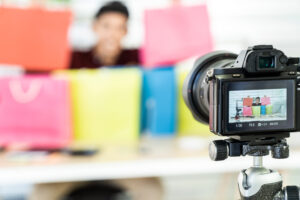Social Media Influencers Are Influencing Counterfeit Sales

In the world of modern marketing, social media influencers have carved out an interesting niche. They’ve established thought leadership in their industries, and once that happens, they have massive sway over their followers’ purchase decisions. A recent study from the United Kingdom, however, shows these influencers play a big part in counterfeit sales as well.
The study comes from the Intellectual Property Office of the United Kingdom — the UK’s version of the U.S. Patent and Trademark Office. It delved into the purchase behaviors of those who follow influencers, and it discovered some interesting statistics regarding trademark counterfeiting. In fact, social media influencers could be inadvertently contributing to tens of billions in counterfeit sales.
Social Media Influencers and Counterfeits
Endorsements from social media influencers are a big deal. For instance, Kylee Jenner gets $1.2 million for every sponsored post she puts out. People trust influencers, so their endorsements can prove invaluable to brands. Unfortunately, this is just as true for entities selling illegal counterfeit items as it is for legitimate companies.
The study we mentioned earlier found that 10% of those who purchase counterfeit items were prompted by social media influencers to do so. This may not seem like much, but when the global counterfeit trade sits at $509 billion, this equates to nearly $51 billion in annual illegal sales directly linked to influencers.
It’s important to point out that this study only looked at a specific population. Prior research showed that women are more likely to buy products due to influencer promotions, so researchers focused their study on counterfeit sales on female consumers. Still, the results show a troubling and growing problem with social media influencers on knockoff products.
Social Media Counterfeit Sales Aren’t New
The sale of counterfeit items on social media is nothing new. A recent study found that 15% of all posts that had commercial or branded hashtags led to these fake products. Regulators have also had problems with social media influencers over their promotional tactics, and discussion of new regulations has stemmed directly from their actions.
The promotion of knockoff items by these influencers, however, is only recently coming into the spotlight. Trademark infringement carries stiff penalties, but influencers seem to skirt the law. This is problematic due to the massive rise in promoted posts. Since a single dollar results in a return of over $6 in investment, it’s no wonder brands are looking towards influencers.
Unfortunately, it’s not just buyers who knowingly buy counterfeits that make these purchases. A full 3% of those who buy counterfeit items did so because of influencers — but they had no idea they were purchasing a fraudulent item. This means many consumers are receiving subpar products — some that could be potentially dangerous — because they believe influencers are promoting legitimate products.
What Happens Now?
Some see trademark protection as nothing more than a profit issue. They think companies are merely upset because they’re losing money, and in fact, they may very well be correct. The issue is much bigger than this, however, since counterfeit sales often fund organized crime and even terrorist activities. In reality, social influencers promoting fake items is not a victimless crime.
Unfortunately, the influencers who influence illegal sales often face no repercussions. If you search for such stories on Google, a single Amazon case against two influencers is almost all you’ll find. This is strange since brands could have a claim of contributory infringement against these social media personalities.
Since the policing of such issues relies on the brands themselves, though, counterfeit sales linked to social media influencers may remain a major problem. Until the issue is taken seriously on a federal level, consumers will likely continue to be victimized by thought leaders taking advantage of their followers.













